Currently reading
Power & Civility (The Civilizing Process, Vol. 2)
The Tao of Travel: Enlightenments from Lives on the Road
The Romantic Movement: Sex, Shopping and the Novel
What Was She Thinking?: Notes on a Scandal, Library Edition
 Personally, I prefer this translation over the much-publicized, "Oprah's Book Club" Pevear and Volokhonsky.
Personally, I prefer this translation over the much-publicized, "Oprah's Book Club" Pevear and Volokhonsky.
Blue Nights
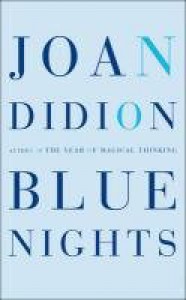 Personally, I think fans of Murakami won't enjoy this book because of its apologetic nature. The first essay--the one about neuroscience--is simply an attempt at a novel way of seeing Murakami, by applying a theory of neuroscience to an author who is fast becoming famous worldwide. That said, the essay fails to deliver, because there really isn't anything remarkable about it; I don't understand why one needs to find a new theory/topic and apply it to Murakami, when there are just so many things to discuss about him. It could have worked, but I suppose the writer (also the main lecturer of the conference on Murakami) was in a hurry to write his paper, or was simply out to impress. The other pieces were also unremarkable. For a group of supposedly enthusiastic Murakami 'groupies', their papers were bland. The same thing was repeated: Murakami appeals to this generation of readers because he writes about the loneliness that this generation feels, set against a rapidly-changing urban environment. I also seemed to get the fact that Murakami is becoming famous because of his Western references. I know the writers were against this, but somehow this was what came out in their essays. references to Coke and Western musicians propelled Murakami to international stardom. This makes us see the West as the universal factor which unites everyone.I also seemed to get the feel that the writers were blaming the English translators for being slow; other countries have published other books by Murakami, whereas the English translators haven't. Maybe the underlying theme of this book is the politics of translation; now THAT would have been an interesting study.
Personally, I think fans of Murakami won't enjoy this book because of its apologetic nature. The first essay--the one about neuroscience--is simply an attempt at a novel way of seeing Murakami, by applying a theory of neuroscience to an author who is fast becoming famous worldwide. That said, the essay fails to deliver, because there really isn't anything remarkable about it; I don't understand why one needs to find a new theory/topic and apply it to Murakami, when there are just so many things to discuss about him. It could have worked, but I suppose the writer (also the main lecturer of the conference on Murakami) was in a hurry to write his paper, or was simply out to impress. The other pieces were also unremarkable. For a group of supposedly enthusiastic Murakami 'groupies', their papers were bland. The same thing was repeated: Murakami appeals to this generation of readers because he writes about the loneliness that this generation feels, set against a rapidly-changing urban environment. I also seemed to get the fact that Murakami is becoming famous because of his Western references. I know the writers were against this, but somehow this was what came out in their essays. references to Coke and Western musicians propelled Murakami to international stardom. This makes us see the West as the universal factor which unites everyone.I also seemed to get the feel that the writers were blaming the English translators for being slow; other countries have published other books by Murakami, whereas the English translators haven't. Maybe the underlying theme of this book is the politics of translation; now THAT would have been an interesting study.
The Sensualist
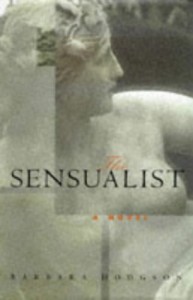 Anatomy, history, (dis)embodiment are some of the focus of this novel. Not quite sure whether it's interestingly nice or just strange: it's that kind of book. The visuals were beautiful; however, the text and story don't seem to deliver, despite its promising premise. Hodgson could have done so much with her researches on the history of anatomy, including the themes which she chose--disembodiment and disjointedness--but somehow they fail to capture one's emotions and attention. That said, the visual additions (pop-ups, pages from anatomy books) seem as if they were only included to spice up an otherwise plain story.
Anatomy, history, (dis)embodiment are some of the focus of this novel. Not quite sure whether it's interestingly nice or just strange: it's that kind of book. The visuals were beautiful; however, the text and story don't seem to deliver, despite its promising premise. Hodgson could have done so much with her researches on the history of anatomy, including the themes which she chose--disembodiment and disjointedness--but somehow they fail to capture one's emotions and attention. That said, the visual additions (pop-ups, pages from anatomy books) seem as if they were only included to spice up an otherwise plain story.
Mapping the Mind
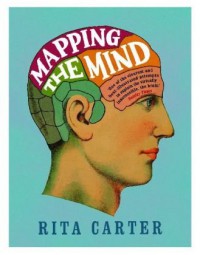 If one wants to learn about the basics of neuroscience or simply how the brain works, this book serves as a good introduction. It has wonderful, 3D illustrations, and the language is easy enough to understand. It (literally) copies the main ideas from the important thinkers such as Sacks, Ramachandran, Le Doux and others. (I'm not sure how science books deal with citing case studies and other important ideas, but although it mentions the names of these thinkers, it doesn't really cite them directly for it.) That said, it is definitely more interesting and rewarding to read about the ideas, theories and studies from the main sources themselves. Typographical errors aside, this book, read slowly, might serve to heighten one's interest in the neurosciences.
If one wants to learn about the basics of neuroscience or simply how the brain works, this book serves as a good introduction. It has wonderful, 3D illustrations, and the language is easy enough to understand. It (literally) copies the main ideas from the important thinkers such as Sacks, Ramachandran, Le Doux and others. (I'm not sure how science books deal with citing case studies and other important ideas, but although it mentions the names of these thinkers, it doesn't really cite them directly for it.) That said, it is definitely more interesting and rewarding to read about the ideas, theories and studies from the main sources themselves. Typographical errors aside, this book, read slowly, might serve to heighten one's interest in the neurosciences.
Everything Is Illuminated: A Novel
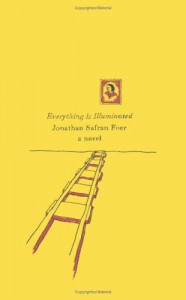 This is a bit difficult to read, but sooner or later, the quirky English will amuse you, and as the story goes deeper, it will hook you in. There are many beautiful lines scattered all throughout this magic realist novel, but the ending felt rushed; it was as if the author realizes he is about to end the book, and everything was crammed in an attempt to shock and move the reader. It does the job, but one only wishes he took the story and spread it throughout, to make this promising novel less tiresome to read.
This is a bit difficult to read, but sooner or later, the quirky English will amuse you, and as the story goes deeper, it will hook you in. There are many beautiful lines scattered all throughout this magic realist novel, but the ending felt rushed; it was as if the author realizes he is about to end the book, and everything was crammed in an attempt to shock and move the reader. It does the job, but one only wishes he took the story and spread it throughout, to make this promising novel less tiresome to read.
Committed: A Skeptic Makes Peace with Marriage
 This book drowned in discalimers. Before it even starts, the author throws in a lengthy discalimer, which basically says "I'm sorry, but this isn't 'Eat, Pray, Love' anymore." Even in her descriptions of people and cultures, she keeps interfering. She doesn't let her readers read, and she doesn't let the places she sees and the people she meets naturally talk to her readers, the way she did in her previous book. Sometimes she goes on to contradict what she says. We end up with a jumbled narrative which is reflective of how she feels about marriage. In her confusion, she takes us with her; in her research, sometimes I felt as if she was purposely looking for things which would affirm what she (wanted to) believe in. It is very much in character, though; it's typical of her to intellectualize things too much, thus ending up with an overly-anxious self (and book). It seemed as if she was making excuses all throughout the book, which I don't understand, since the book could very well stand on its own. Maybe her publishers kept telling her how different this one is from her previous best-seller. Next time, she ought to just listen to herself and forget about everyone else. I felt short-changed in some parts (especially the one on Cambodia), but the book isn't really a travel book, since they were forced to move around, and couldn't absorb everything thoroughly. Also, in spite of all these, there is something about the author that makes you want to root for her marriage, perhaps because of her innocence regarding the matter or her tendency to over-intellectualize things. You might find yourself skimming through several parts if you aren't interested with the topic of marriage, though.
This book drowned in discalimers. Before it even starts, the author throws in a lengthy discalimer, which basically says "I'm sorry, but this isn't 'Eat, Pray, Love' anymore." Even in her descriptions of people and cultures, she keeps interfering. She doesn't let her readers read, and she doesn't let the places she sees and the people she meets naturally talk to her readers, the way she did in her previous book. Sometimes she goes on to contradict what she says. We end up with a jumbled narrative which is reflective of how she feels about marriage. In her confusion, she takes us with her; in her research, sometimes I felt as if she was purposely looking for things which would affirm what she (wanted to) believe in. It is very much in character, though; it's typical of her to intellectualize things too much, thus ending up with an overly-anxious self (and book). It seemed as if she was making excuses all throughout the book, which I don't understand, since the book could very well stand on its own. Maybe her publishers kept telling her how different this one is from her previous best-seller. Next time, she ought to just listen to herself and forget about everyone else. I felt short-changed in some parts (especially the one on Cambodia), but the book isn't really a travel book, since they were forced to move around, and couldn't absorb everything thoroughly. Also, in spite of all these, there is something about the author that makes you want to root for her marriage, perhaps because of her innocence regarding the matter or her tendency to over-intellectualize things. You might find yourself skimming through several parts if you aren't interested with the topic of marriage, though.
Abandon the Old in Tokyo
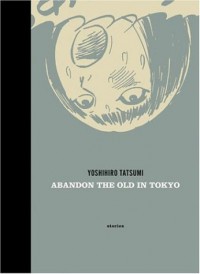 Soft and yet gritty drawings of everyday life in Japan during the 70's. The sordid reality of the characters is very tangible in Tatsumi's work; however, it is balanced with light humor. This graphic medium has succeeded in bringing together the Japanese of today and yesterday, as well as bringing in the readers to experience their reality. Tatsumi's perspective is spot on, and his eye serves as a perfect record of humanity's destruction, as well as occasional glimpses of beauty, as shown in this series of oftentimes-strange stories. He never leaves anything out; the buildings and the walls pop out at you, and they are also characters in the stories. Delving into the deeper characters of people and how they cope, no matter how strange or repulsive, at the end of the day, it shows that it is man's survival that is important. And though the characters may seem to be defeated and weak, the stories' importance lies on the fact that the characters have indeed survived, even if they still live in their "one room castles." For they still recognize freedom and they continue, and this is just enough to save them.
Soft and yet gritty drawings of everyday life in Japan during the 70's. The sordid reality of the characters is very tangible in Tatsumi's work; however, it is balanced with light humor. This graphic medium has succeeded in bringing together the Japanese of today and yesterday, as well as bringing in the readers to experience their reality. Tatsumi's perspective is spot on, and his eye serves as a perfect record of humanity's destruction, as well as occasional glimpses of beauty, as shown in this series of oftentimes-strange stories. He never leaves anything out; the buildings and the walls pop out at you, and they are also characters in the stories. Delving into the deeper characters of people and how they cope, no matter how strange or repulsive, at the end of the day, it shows that it is man's survival that is important. And though the characters may seem to be defeated and weak, the stories' importance lies on the fact that the characters have indeed survived, even if they still live in their "one room castles." For they still recognize freedom and they continue, and this is just enough to save them.
A Week at the Airport
 This one feels very much like a commissioned book. It isn't at par with the other de Botton books, but it still has some interesting thoughts, sandwiched between ramblings and images of the airport and the people in it. In a way, it feels like an essay that was stretched so it could be published into a book, and also satisfy the patron/sponsor. I'd still recommend the book, but potential readers may just want to borrow it, due to its steep price (there are many images inside which aren't particularly beautiful or striking).
This one feels very much like a commissioned book. It isn't at par with the other de Botton books, but it still has some interesting thoughts, sandwiched between ramblings and images of the airport and the people in it. In a way, it feels like an essay that was stretched so it could be published into a book, and also satisfy the patron/sponsor. I'd still recommend the book, but potential readers may just want to borrow it, due to its steep price (there are many images inside which aren't particularly beautiful or striking).
Emerging Mind
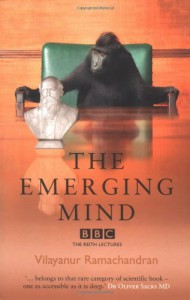 A concise version of Ramachandran's "Phantoms in the Brain." This book is almost exactly the same. Read the other book for a more in-depth analysis of Ramachandran's neurological theories and studies. Also, this book is exactly the same as "A Brief Tour of Human Consciousness." I don't know why all 3 books are published in different titles but with all the same content.
A concise version of Ramachandran's "Phantoms in the Brain." This book is almost exactly the same. Read the other book for a more in-depth analysis of Ramachandran's neurological theories and studies. Also, this book is exactly the same as "A Brief Tour of Human Consciousness." I don't know why all 3 books are published in different titles but with all the same content.
Habibi
 While I appreciate the research that went into this book, I'm a bit ambivalent when it comes to the narrative. It's a story of different kinds of love, across time and space--which I'm not sure if I can say is wholly original. The drawings are beautiful--even breathtaking at times (the village scenes and drawings of the woman's body, filled with Arabic script)--but the narrative itself feels a bit half-baked. I enjoyed the use of the script metaphorically, incorporated in the storyline. The graphic novel was executed well, in the sense that the drawings flowed well like the script and the story served to educate: faith (and love, for that matter), in reality, don't start with god but within one's self; spreading out to encompass others, the world around us, and to a god.
While I appreciate the research that went into this book, I'm a bit ambivalent when it comes to the narrative. It's a story of different kinds of love, across time and space--which I'm not sure if I can say is wholly original. The drawings are beautiful--even breathtaking at times (the village scenes and drawings of the woman's body, filled with Arabic script)--but the narrative itself feels a bit half-baked. I enjoyed the use of the script metaphorically, incorporated in the storyline. The graphic novel was executed well, in the sense that the drawings flowed well like the script and the story served to educate: faith (and love, for that matter), in reality, don't start with god but within one's self; spreading out to encompass others, the world around us, and to a god.
Unaccustomed Earth
 Having read both of Lahiri's books before, I think I can somehow see why this one wasn't enjoyable for me. (I didn't like "Interpreter" either, although I could very much appreciate her style.) This book has over-used and obvious metaphors, unlike her first story collection. Interpreter left you haunted with its stories; while this one, though it shows you the frailty of the human condition, just pretty much does that. It tells stories, makes you reflect, and lets you forget them. In fact, the stories feel quite tiresome, as they themselves are quite over-used. You feel as if you're meeting different characters which, when they turn their backs on you, make you realize that it's the same person being used as different characters over and over again. The formal restraint in her previous story collection showed you the stories' profundity and the writer's maturity, whereas in this book, it just felt annoying and clicheish, if not amateurish.
Having read both of Lahiri's books before, I think I can somehow see why this one wasn't enjoyable for me. (I didn't like "Interpreter" either, although I could very much appreciate her style.) This book has over-used and obvious metaphors, unlike her first story collection. Interpreter left you haunted with its stories; while this one, though it shows you the frailty of the human condition, just pretty much does that. It tells stories, makes you reflect, and lets you forget them. In fact, the stories feel quite tiresome, as they themselves are quite over-used. You feel as if you're meeting different characters which, when they turn their backs on you, make you realize that it's the same person being used as different characters over and over again. The formal restraint in her previous story collection showed you the stories' profundity and the writer's maturity, whereas in this book, it just felt annoying and clicheish, if not amateurish.
Pride and Prejudice and Zombies: Dawn of the Dreadfuls (Quirk Classics)
 Though intended as a prequel to Pride and Prejudice and Zombies, this is a book in itself. I like the plot twists and the fights, but it didn't satisfy my questions regarding the Bennet's backstory, as I was waiting for the sisters' trip to China (as mentioned in the original Pride and Zombies book), and wondered why the story showed the slightly-fake Master Hawksworth. I don't think it succeeded greatly as a prequel to Pride and Zombies, but as a book/story in itself, it was pretty good.
Though intended as a prequel to Pride and Prejudice and Zombies, this is a book in itself. I like the plot twists and the fights, but it didn't satisfy my questions regarding the Bennet's backstory, as I was waiting for the sisters' trip to China (as mentioned in the original Pride and Zombies book), and wondered why the story showed the slightly-fake Master Hawksworth. I don't think it succeeded greatly as a prequel to Pride and Zombies, but as a book/story in itself, it was pretty good.
Pride and Prejudice and Zombies: The Classic Regency Romance - Now with Ultraviolent Zombie Mayhem!
 Among the three (so far) Quirk classics, to me, only Pride and Zombies stands out as a, well, true classic. It alters some parts of the story to wonderfully accommodate the unmentionables, making for a humorous and revolting read. If you think the latter was too much, well, it is a book on zombies after all! I have to mention though that some of the illustrations were wrong; they didn't go with the descriptions in the story (for instance: the scene with Lady Catherine and Elizabeth's fight, together with the 3 ninjas).
Among the three (so far) Quirk classics, to me, only Pride and Zombies stands out as a, well, true classic. It alters some parts of the story to wonderfully accommodate the unmentionables, making for a humorous and revolting read. If you think the latter was too much, well, it is a book on zombies after all! I have to mention though that some of the illustrations were wrong; they didn't go with the descriptions in the story (for instance: the scene with Lady Catherine and Elizabeth's fight, together with the 3 ninjas).
The Graveyard Book
 This felt more like a series of short stories about a young boy raised in the graveyard. Still, my faith in Gaiman is restored, after the weak Anansi Boys. Only Neil Gaiman can pull off something that centers on death to become a celebration of life. A poignant story of a boy who is lucky enough to be taught the value of life, ironically (or perhaps not) by a group of dead people who took care of him. Silas reminded me of Dream (Sandman), and the Jacks felt a little tacked-on and underdeveloped. Still a good read, nonetheless!
This felt more like a series of short stories about a young boy raised in the graveyard. Still, my faith in Gaiman is restored, after the weak Anansi Boys. Only Neil Gaiman can pull off something that centers on death to become a celebration of life. A poignant story of a boy who is lucky enough to be taught the value of life, ironically (or perhaps not) by a group of dead people who took care of him. Silas reminded me of Dream (Sandman), and the Jacks felt a little tacked-on and underdeveloped. Still a good read, nonetheless!
THE ANGEL'S GAME
 Angel's Game is a watered-down version of the magic that Zafon gave us in Shadow of the Wind. There are more witty lines, more character analyses, and though these are a welcome change or addition, somehow the magic is a bit lost. The ending made me feel a bit shortchanged. It might be unfair to compare this to Shadow, but it is the same author and it is said to be a follow-up to the book. There are too many loose ends in this one, and everything seemed rushed in the end--the suicide, the manuscript being left in the Cemetery of Forgotten BOOKS; Shadow was packed tightly, and this just wasn't. Shadow made you believe in unrealistic things (hence the magic), but Angel only served to confuse. The assignment/topic David had to write about seemed out of place in the whole story, though occassionally, some bits of brilliance (or was it foreshadowing) showed through, as he slowly became what he was writing about.It's still the type of book you'd want to curl up with in bed during a stormy eve and read until dawn; I'd still recommend this book to fans of Zafon and crime/mystery readers. But instead of a Shadow that haunts you beautifully long after the story has ended, this one is more like an enjoyable Game that leaves you feeling a bit confused in the end.
Angel's Game is a watered-down version of the magic that Zafon gave us in Shadow of the Wind. There are more witty lines, more character analyses, and though these are a welcome change or addition, somehow the magic is a bit lost. The ending made me feel a bit shortchanged. It might be unfair to compare this to Shadow, but it is the same author and it is said to be a follow-up to the book. There are too many loose ends in this one, and everything seemed rushed in the end--the suicide, the manuscript being left in the Cemetery of Forgotten BOOKS; Shadow was packed tightly, and this just wasn't. Shadow made you believe in unrealistic things (hence the magic), but Angel only served to confuse. The assignment/topic David had to write about seemed out of place in the whole story, though occassionally, some bits of brilliance (or was it foreshadowing) showed through, as he slowly became what he was writing about.It's still the type of book you'd want to curl up with in bed during a stormy eve and read until dawn; I'd still recommend this book to fans of Zafon and crime/mystery readers. But instead of a Shadow that haunts you beautifully long after the story has ended, this one is more like an enjoyable Game that leaves you feeling a bit confused in the end.
The Arrival
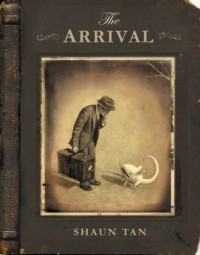 With all the raving reviews in amazon, I was excited to get a copy, but couldn't really believe how a picture book-cum-graphic novel could evoke such emotions as described by the readers/reviewers. But the pictures blew me away; loneliness and fear were carefully brought out in the geometric figures; surreal landscapes evoke a feeling of awe and wonder, and while the pictures looked vintage, they were also futuristic, or even apocalyptic; stunning images which sear your mind. It perfectly captures the "immigrant", but everyone can relate, as everyone has been a traveller at some point in his/her life. This book, in a way, shows how, as travellers, it is really ourselves we hope to find in the end.
With all the raving reviews in amazon, I was excited to get a copy, but couldn't really believe how a picture book-cum-graphic novel could evoke such emotions as described by the readers/reviewers. But the pictures blew me away; loneliness and fear were carefully brought out in the geometric figures; surreal landscapes evoke a feeling of awe and wonder, and while the pictures looked vintage, they were also futuristic, or even apocalyptic; stunning images which sear your mind. It perfectly captures the "immigrant", but everyone can relate, as everyone has been a traveller at some point in his/her life. This book, in a way, shows how, as travellers, it is really ourselves we hope to find in the end.






